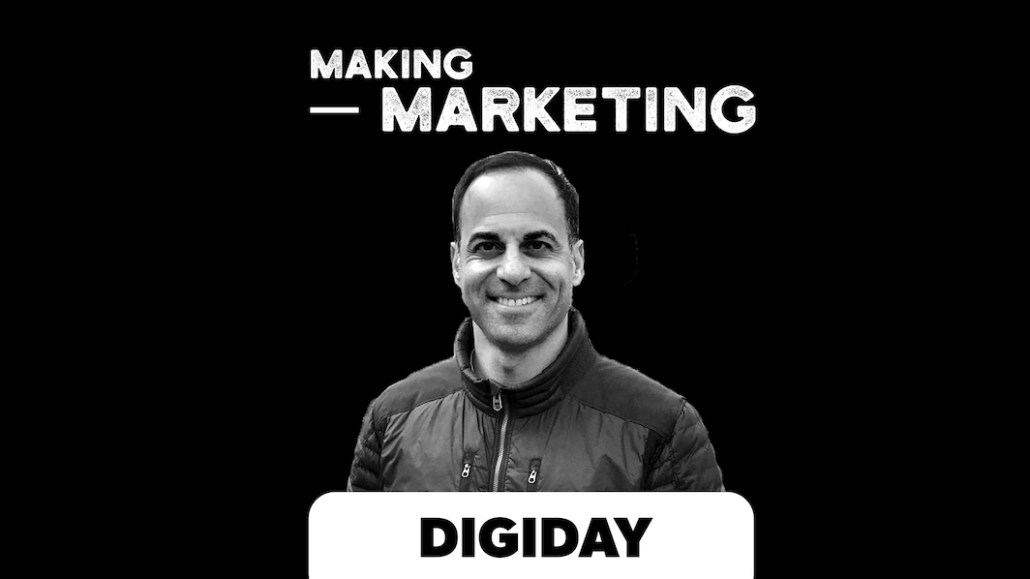Secure your place at the Digiday Publishing Summit in Vail, March 23-25
ThredUp president Anthony Marino: ‘Facebook’s not getting any cheaper or easier for advertisers’

Subscribe: iTunes | Google Play | Stitcher | RSS | Anchor
At any given moment, millions of articles of clothing are coursing through ThredUp’s logistics behemoth. Founded 10 years ago, the company will send you an empty bag for you to fill with clothes that you want to cash in on. Then they’ll take them off of your hands to photograph, price, and ultimately sell online — after which, of course, you pocket some consignment money.
“The source of all of that amazing product are the closets across America. It turns out that people buy a lot of stuff, and even when they don’t need to buy more, they buy more,” said Anthony Marino, ThredUp’s president (and formerly its CMO). “If you look at some recent statistics, in the United States, people buy on average 65 to 70 new items every year, and they wear them maybe 6 or 7 times and then never again.”
Selling stuff through ThredUp, Anthony says, users can both experience the “life-changing magic of tidying up” so astutely promoted by Marie Kondo — and feel like they’re doing their part to reduce waste. Edited highlights below.
Why retention gets most of his attention
“It’s really hard to make the economics of acquiring a new customer work if you have a really leaky bucket. Facebook’s not getting any cheaper or easier for any advertisers, and there’s not a ton of options out there if you are a performance-minded advertiser. So the retention part is one of the things you can actually have more control over. You can’t control any of these auctions when you’re bidding for ad space. You can’t control the seasonality of the ads business. Increasingly, ad platforms are rolling into their tools very powerful targeting tools that otherwise companies like ours may have built in-house in the past, that gave us an edge. Google and Facebook and others are instead rolling that out to everyone.”
“If you can’t beat them” (say the clothing brands), “join them”
“It turns out that processing unique items of clothing by the millions, which is what we do now (at any given moment, there’s millions of items of clothing coursing through our logistics network) — it takes a lot of work to get to that scale, to be able to photograph items, price them, attribute them. The technology and operations that powers resale is really significant. And so when brands start to think about doing this on their own, they explore it and then they’re like ‘oh my goodness, how can we do this?’ and so they’re then starting to reach out to us, which is wonderful.”
The Life-Changing Magic of Netflix
“[Marie Kondo’s show] affected us in a good way. We saw a spike in our receipt and requests of our clean-out bags and labels. For me it just reminded me of how the Netflix homepage is an incredibly powerful thing. But I think it tapped into a zeitgeist that was well under way. People have had busy and crowded closets and garages for a really long time, and it’s just now that they’re saying ‘there’s gotta be a better way than for all of this stuff to sit here, there’s gotta be a better way to extract value from it, do something good for the environment, and maybe even put it into the hands of somebody else who will really appreciate it.”
More in Marketing

‘The conversation has shifted’: The CFO moved upstream. Now agencies have to as well
One interesting side effect of marketing coming under greater scrutiny in the boardroom: CFOs are working more closely with agencies than ever before.

Why one brand reimbursed $10,000 to customers who paid its ‘Trump Tariff Surcharge’ last year
Sexual wellness company Dame is one of the first brands to proactively return money tied to President Donald Trump’s now-invalidated tariffs.

WTF is Meta’s Manus tool?
Meta added a new agentic AI tool to its Ads Manager in February. Buyers have been cautiously probing its potential use cases.





